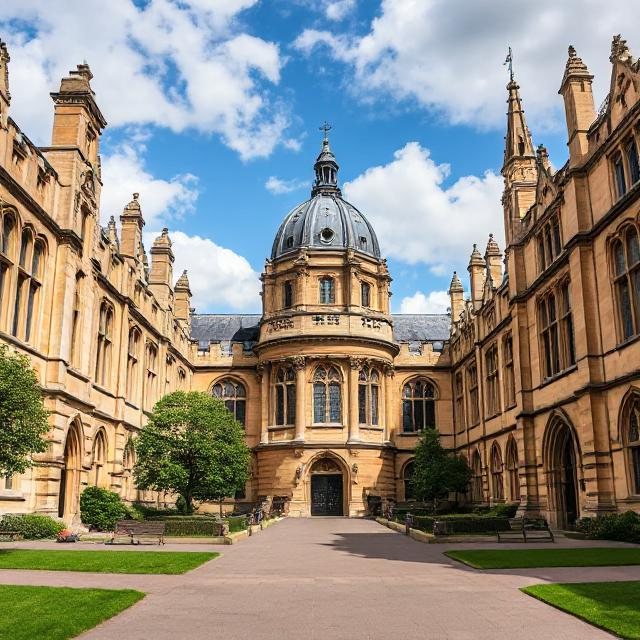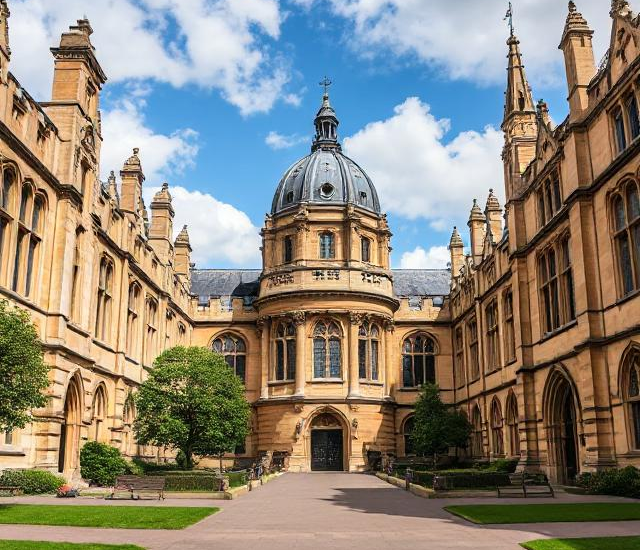University of Oxford: A Legacy of Academic Excellence

Introduction
The University of Oxford, founded in the 12th century, is the oldest university in the English-speaking world. Located in Oxford, England, it is renowned globally for its academic excellence, historic traditions, and influential alumni. Oxford consistently ranks among the top universities worldwide and has played a crucial role in shaping higher education, scientific research, and global leadership.
This article explores Oxford’s history, academic structure, research contributions, student life, notable alumni, and global influence.
Historical Background
Oxford’s origins date back to 1096, making it over 900 years old. It saw significant growth in 1167 when English students were banned from attending the University of Paris, leading many scholars to Oxford.
In 1249, the first colleges—University College, Balliol College, and Merton College—were established, laying the foundation for the collegiate system Oxford follows today. Over the centuries, the university expanded, becoming a center of learning, philosophy, and scientific discovery.
During the Renaissance and Enlightenment periods, Oxford was at the forefront of intellectual advancement. It played a key role in the scientific revolution, with figures such as Robert Boyle and Christopher Wren contributing to fields like physics, astronomy, and engineering.
Academic Excellence and Structure
Oxford is composed of 39 colleges and six Permanent Private Halls, each with its own governing body and traditions. The university offers a broad range of undergraduate and postgraduate programs across four academic divisions:
1. Humanities
- Subjects include Philosophy, History, Classics, Literature, and Theology.
- The Faculty of Philosophy is among the most influential in the world.
2. Mathematical, Physical, and Life Sciences
- Includes Physics, Chemistry, Biology, and Engineering.
- The Oxford Physics Department has made major contributions to quantum mechanics and astrophysics.
3. Medical Sciences
- Oxford’s Medical School is ranked among the best globally.
- Research focuses on public health, genetics, and neuroscience.
4. Social Sciences
- Includes Economics, Law, Political Science, and International Relations.
- The Blavatnik School of Government trains future world leaders.
Oxford’s tutorial system is unique, emphasizing one-on-one discussions between students and tutors, fostering deep intellectual engagement.
Research and Innovation
Oxford is a leading research institution, contributing to science, medicine, and social policy. Key areas include:
1. Medical and Life Sciences
- Oxford played a crucial role in developing the AstraZeneca COVID-19 vaccine.
- Research in genetics, immunology, and infectious diseases is world-renowned.
2. Artificial Intelligence and Computing
- The university is at the forefront of machine learning and AI ethics.
- Collaborations with Google DeepMind and Microsoft drive technological advancements.
3. Climate and Environmental Science
- Oxford’s Environmental Change Institute leads in sustainability research.
- Studies focus on climate modeling, renewable energy, and conservation.
Oxford receives billions in funding for research, influencing global policies and technological advancements.
Student Life and Traditions
Oxford offers a unique student experience, blending rigorous academics with rich traditions.
1. Formal Hall Dinners
- Students dine in grand halls, wearing academic gowns.
- Some colleges, like Christ Church and Magdalen, have historic dining halls.
2. May Morning and Boat Races
- May Morning celebrations include a dawn choir performance at Magdalen College Tower.
- The annual Oxford-Cambridge Boat Race is one of the oldest sports rivalries in the world.
3. Student Societies and Clubs
- The Oxford Union is famous for hosting debates with world leaders and celebrities.
- Oxford has over 400 student clubs, covering sports, arts, music, and politics.
Global Influence and Notable Alumni
Oxford has produced some of the most influential figures in politics, science, literature, and business.
1. Political Leaders
- Boris Johnson, Theresa May, and David Cameron – Former UK Prime Ministers.
- Bill Clinton – Former U.S. President.
- Indira Gandhi – Former Prime Minister of India.
2. Scientists and Innovators
- Stephen Hawking – Renowned theoretical physicist.
- Tim Berners-Lee – Inventor of the World Wide Web.
- Howard Florey – Co-discovered penicillin, revolutionizing medicine.
3. Writers and Philosophers
- J.R.R. Tolkien – Author of The Lord of the Rings.
- C.S. Lewis – Author of The Chronicles of Narnia.
- Isaiah Berlin – Political philosopher and historian.
Oxford’s alumni network spans across industries, impacting governments, corporations, and academia worldwide.
Global Partnerships and Collaborations
Oxford collaborates with institutions globally, expanding research and academic opportunities.
- Harvard University and MIT – Research in medicine and technology.
- European Space Agency (ESA) – Contributions to space exploration.
- United Nations (UN) – Policy advisory on climate and global health.
Oxford’s extensive partnerships ensure that it remains a hub for international research and innovation.
Challenges and Future Prospects
Despite its success, Oxford faces challenges such as:
- Accessibility and Diversity – Ensuring students from all backgrounds have opportunities to study at Oxford.
- Sustainability – Reducing the university’s carbon footprint and promoting green initiatives.
- Digital Transformation – Adapting to online learning and AI-driven education models.
The university is addressing these through scholarship programs, sustainability initiatives, and investment in digital education.
Conclusion
The University of Oxford remains a beacon of academic excellence, research innovation, and leadership. With its historic legacy, world-class faculty, and global partnerships, Oxford continues to shape the future of education and knowledge.
For students, scholars, and researchers, Oxford offers an unparalleled opportunity to engage with cutting-edge research, intellectual traditions, and a global network of leaders. As it looks toward the future, Oxford remains committed to pushing the boundaries of human knowledge and societal progress.
